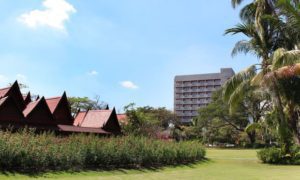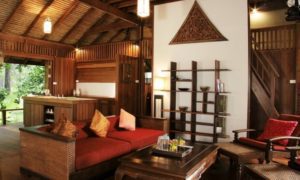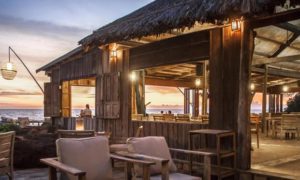In Thailand, Vietnam and across Asia, these eco-lodges and hotels are recycling, composting and reclaiming to reduce their impact on the environment.
The Yard Hostel, Bangkok, Thailand

Yes, some of the structures are made from recycled shipping containers. And yes, recycled paper is used as insulation to keep the buildings cool. Inverter air conditioners and LED lights to save energy and refillable glass water bottles for guests eliminate the need for plastic, while composted waste keeps the garden green – and the mojitos minty. But what is really remarkable about The Yard (a reference to both the greenery and a play on the Thai word for “relatives”) is its location at the heart of the galleries, boutiques and eateries of the cool Ari neighbourhood, a welcome respite from the concrete jungle and roar of traffic in the heart of Bangkok.
• Dorm beds from £12, doubles from £27 B&B, theyardhostel.com
Sampran Riverside, Nakhon Pathom, Thailand

Sampran Riverside (around 40km west of Bangkok) was a pioneer when it opened in 1962, highlighting Thai culture in live shows and hands-on workshops. The resort continues to innovate and has embraced organic tourism, positioning itself as a destination for promoting a better understanding between farmers and consumers. Sampran supports fair trade, has banned agrochemicals, recycles oil, and trains staff in managing food waste and sustainable practices. Guests can practise a host of traditional Thai crafts, swim in the chlorine-free pool or visit local farms, including the hotel’s own Patom Organic Farm. It also runs a cafe in Bangkok featuring produce from the 170 local farmers it supports and has enlisted other restaurants and hotels to commit to buying direct form the collective, part of a supply cycle it calls the Sampran Model.
• From £55, sampranriverside.com
Golden Buddha Beach Resort, Koh Phra Thong, Thailand

There are just six hotels on remote Koh Phra Thong (Golden Buddha Island) and the island’s namesake resort offers comforts such as its own beachfront club house and bar. The bungalows and treehouses have no air conditioning, relying on sea breezes and solar panels that power fans and heat water. Waste is shipped to the mainland for appropriate disposal and the proceeds from recycling are returned to the staff. Plastic bags have been banned from housekeeping and reusable crates or disposable bamboo are used whenever possible. Other sustainable details include washing-up liquid produced from the peel leftovers from orange juice and gift shop items sourced in Thailand and made of natural cotton and hemp.
• From £88 B&B, goldenbuddharesort.com
Mango Bay Resort, Ong Lang Beach, Phú Quốc, Vietnam

This sprawling beachfront resort on Vietnam’s largest island prides itself on raising awareness of green issues. On an island where tourism is fast supplanting the traditional trades of fishing and fish-sauce production, Mango Bay’s bungalows are built with low-impact techniques and materials that respect the landscape. The resort has supported the regeneration of the reef by working with local fishermen and sponsors regular cleaning campaigns. Its also supports the work of NGO Wildlife at Risk in its work to preserve the island’s flora and fauna, including providing safe habitats and replanting native species.
• Bungalows from £100 B&B, mangobayphuquoc.com
Baby Elephant Boutique Hotel, Siem Reap, Cambodia

The Baby Elephant is a sustainable-focused property in the heart of Siem Reap, where most visitors who come to explore the sprawling ruins of Angkor Wat stay. Waste becomes compost and food for farm animals, and cardboard and glass are reused on-site or given to people who reuse the items, such as glass bottles that go to the roadside petrol vendors. Cooking oil is converted to biodiesel by the NGO Naga Earth. The on-site organic garden provides ingredients for the bar, kitchen, spa and for staff meals. It is also a Refill not Landfill drinking-water refill station. Baby Elephant has taken its approach to the environment seriously, working with experts to examine every aspect of its activity, from optimising water drainage to planning maintenance schedules, from reducing plastic to training staff to be environmentally aware. Even mosquitoes are kept under control with non-toxic, fan-powered traps and lemongrass in the garden.
• Doubles from £30 B&B, babyelephant.asia
Eden Eco Village, Kampot, Cambodia

Started six years ago on the banks of the Prek Teuk Chhou, a short ride outside Kampot, the Eden Eco Village is a collection of bamboo and thatch bungalows on stilts, many of them right over water – and each unit generates its own solar power for lights and fans. Most of the produce is local and the site grows its own mangoes. It recycles and composts everything it can, including the waste of the compost toilets for fertiliser. Life here is set to the rhythm of the water: riverside yoga in the morning, followed by kayaking or dips in the river, natural treatments in the women-only spa and the spectacle of fireflies at night. It’s a short trip to the plantations that produce highly-prized Kampot pepper, the colonial-era town of Kampot and seaside resort of Kep.
• Bungalows from £12 room-only, breakfast from £3, edenkampot.com
Read the full article at The Guardian: https://www.theguardian.com/travel/2019/jan/15/10-best-sustainable-hotels-in-south-east-asia-thailand-vietnam